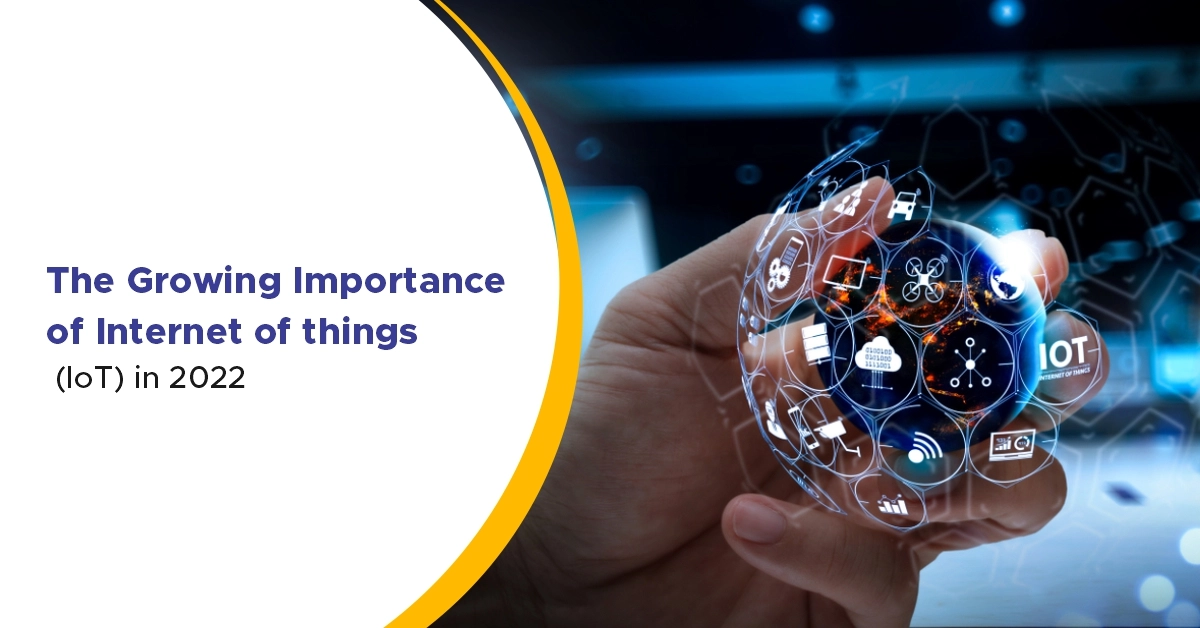The Internet of Things or IoT is a term that covers the network of physical objects that are embedded with sensors, software and other technologies for the purpose of connecting and exchanging data. These could be ordinary household objects or even sophisticated industrial tools.
According to industry reports, there are over 7 billion connected IoT devices at present. This number is expected to grow to 10 billion by 2020 and subsequently to 22 billion by 2025.
IoT has become one of the most important technologies of the 21st century. It has enabled most everyday objects like kitchen appliances, cars, thermostats and baby monitors to be connected to the internet with the help of embedded devices. IoT has gifted the world the possibility of seamless communication between people, processes and things.
In this blog, we are looking at the opportunities that have come up because of IoT and how it will continue to grow in 2022. We will also analyse the career opportunities related to IoT and the salary scope.
Growing Importance of Internet of Things (IoT) in 2022
IoT has been instrumental in enabling advances in a number of different technologies. Some of the notable advantages of IoT are:
-
Low-cost, low-power sensor technology
-
Better connectivity
-
Easier access to infrastructure for businesses
-
Advancement in Machine Learning and Analytics
-
Conversational Artificial Intelligence
Industrial IoT refers to the application of IoT technology in industrial settings. This is particularly relevant to instrumentation and control of sensors and devices that have access to cloud technologies. Industries can now achieve a new automation layer and can create new revenue and business models.
IoT is now being hailed as the fourth wave of industrial revolution. Some of the common instances where IoT is used are:
-
Smart Manufacturing
-
Smart power grids
-
Smart cities
-
Connected logistics
-
Smart digital supply chains
IoT has proven to be extremely helpful in increasing businesses with its use getting increasingly common at marketplaces and companies.
IoT applications
IoT Intelligent Applications are prebuilt software-as-a-service (SaaS) applications that can analyze and present captured IoT sensor data to businesses. IoT applications take the help of Machine Learning algorithms to analyze connected sensor data in the cloud. You can also identify anomalies and send alerts to users and trigger automated fixes.
IoT applications have been deployed in various scenarios. Let’s look at some of the common uses.
-
It is used to create new efficiencies in manufacturing through machine monitoring and product-quality monitoring.
-
This tracking helps businesses to determine asset location. Ring-fencing helps them to make sure that high-value assets are protected.
-
One of the popular uses has been wearable health monitoring devices. Medical practitioners use such devices to monitor the health of patients remotely.
Industries benefiting from IoT
The industries that benefit the most from IoT because of the widespread sensor devices.
-
Manufacturing: IoT is used by manufacturers to gain a competitive advantage. Sensors are used to measure production output. It helps manufacturers to check equipment for accuracy. Companies take the help of IoT to reduce costs, get better uptime and improve asset performance management. This helps companies to reduce operating costs and improve asset performance management.
-
Automotive: The automotive industry has significant advantages because of the use of IoT applications. Sensors can detect equipment failure too.
-
Transportation and logistics: The IoT systems are utilized to monitor and inventor movement. It also helps to reroute goods based on weather conditions, vehicle availability and driver availability.
-
Public sector: IoT has its uses in the public sector like government-owned utilities. In case of mass outages of power, civil services collect data and deploy resources accordingly with the help of IoT.
-
Healthcare: IoT asset monitoring has been great for the healthcare industry. This technology is used by doctors and medical caregivers to help patients with wheelchairs. A lot of hospital assets can be tracked using IoT.
Future Career Scope of IoT in India
We have already seen that IoT has a wide range of applications and so it is quite natural that it will have various career opportunities too. Some of the common job profiles are:
-
Data Analytics – This role requires strong statistical understanding and ability to find correlations. The data analytics expert must be able to work with statistics-based languages like R, SAS and Python libraries like NumPy.
-
Network Architect – These professionals specialize in Network setups and networking. They must be able to design an efficient network architecture and follow all communication protocols.
-
Cyber Security Expert – These experts test a system’s integrity and fix security flaws if any. A cyber security professional should have a good understanding of concepts like vulnerability evaluation and public key encryption.
-
Hardware Developers – These are the people who modify an organisation’s devices for fitting different sensor modules, transmitters and integrators.
-
User Interface Designer – This role requires display and use of creativity. A customer should be able to understand the uses of an app or tool through the user interface.
-
Embedded Programs Engineer – This engineer will be given the task to design several PCBs. The key role is to integrate software engineering with non-computer devices while working closely with the hardware.
Also read: What is the World of the Internet of Things (IoT)
Average Salary of IoT Professionals in India
IoT professionals in India draw a salary that is 76% higher than that of IT professionals. Most IoT professionals get a median salary of Rs 15.2 lakh per annum. For entry-level, IoT professionals make around Rs 3.5 lakh per annum to Rs 6 lakh per annum.
Summary
With so much happening in the IoT world, this is the best time to sign up for a program, so that you have IoT in your resume. This opens up several job opportunities too and what better way to get into the data bandwagon than be a part of it. However, with several institutions offering IoT as part of a degree. It is time to enrol on one of the established places. NIET Greater Noida is surely the best one for you.
NIET offers a four-year undergraduate B.Tech course in IoT. The course has been accredited by NAAC. The college aims to build a solid foundation through systematic training and strong practical skills. The students gain deep knowledge of IoT devices and skills in sensors and instrumentation. NIET teaches through real-time industry projects and regular live sessions with industry experts. It also has a great placement cell. Some of the big names among recruiters are IBM, Capgemini, TCS, Samsung, Accenture, HCL and Wipro.
CTA
Check out more about the specialization in IoT at NIET. Learn about the interesting career opportunities and send in your applications now. Enrol Now!


















